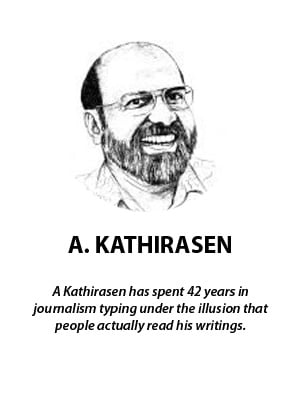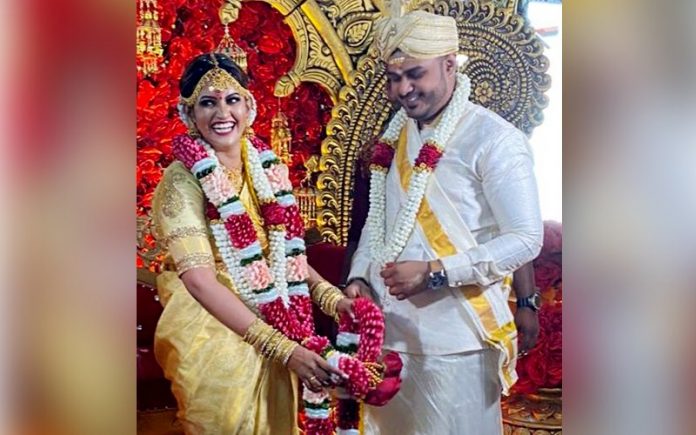
I attended a wedding last week in Penang. It was a Covid-19 wedding.
A tough-looking Rela member was stationed at the entrance to the Arulmigu Thandayuthapani Temple, also known as the Penang Naattukkotai Chettiar Temple, and he took the temperature of everyone who entered while another two watched intently.
This was the first time I had to write down my name and telephone number in a book before attending a wedding. I was one of the fortunate 250 or so allowed to attend the wedding of R Magheswaran and M Shalaneeswary.
It was the first wedding I’d attended where masks were compulsory for entrance. But it didn’t feel odd as we’ve all been wearing a mask for about nine months now. However, I had difficulty recognising some relatives and old friends. We had to lower our masks to fully see each other’s faces and be recognised.
Some observed the SOPs punctiliously, keeping their distance and refusing to lower their masks. I sometimes had to strain my ears to hear properly, as the masks muffled words that were already being drowned out by the celebratory noise around me.
Most people were very conscious of the Covid-19 situation, even as they celebrated the wedding. However, there were also some who gave the impression they were immune to the virus.
Many of those present might not have been able to attend the wedding if the interstate travel restrictions had still been in place. By a stroke of luck, or divine will, the restriction on interstate travel was lifted just three days before Magheswaran’s wedding, much to his relief and that of his parents. Magheswaran is my nephew on my wife’s side.
A niece – my wife’s cousin’s daughter K Sindhu – was less fortunate. Her wedding was held just a week earlier, with only about 30 people present, including the priest. I couldn’t attend due to the interstate travel restriction and the fact that only 30 close family members could be present under the then Covid-19 prevention rules.
Their planned wedding proceeded smoothly, largely because the bride and groom are from Penang and the interstate restriction did not apply.
Another wedding – that of the daughter of a former neighbour – was postponed twice due to the movement control order restrictions.
It was originally planned for May this year but was postponed to October when the interstate restriction was imposed after the number of Covid-19 cases in Klang shot up. You see, the groom lives in Klang, Selangor, while the bride hails from Butterworth, Penang, and with Selangor placed under the conditional movement control order (CMCO), the bride could not come to Klang where the wedding was to be held.
The wedding could not take place even in October, for the same reason. Currently, the number of cases in Klang is rising, so holding a wedding there does not seem possible. The frustrated families will now have to fix a new date, which is not too much of a problem; the problem is getting a space – a temple or hall – to hold the wedding.
I’m sure there are many more couples who are facing similar problems.
The marriage of another couple I know had been fixed for Oct 23, in Semenyih, Selangor. So when the authorities announced, on Oct 11, that Selangor, Putrajaya and Kuala Lumpur would be placed under the CMCO from Oct 13, they acted fast as there were too many uncertainties.
The groom’s side contacted the temple priest to ask if Oct 12 was a propitious day for a wedding. The priest said yes, and they quickly telephoned the bride’s family in Ipoh for a discussion. The bride’s side arrived in two cars that night.
In the meantime, the groom and his family members worked overtime to prepare for the wedding the following morning.
Fortunately, Indians usually buy the wedding clothes and prepare the “thali” (which is tied by the groom around the neck of the bride and is the high point of a Hindu wedding ritual) long before the wedding day. As such, everything that the groom and bride needed was at hand.
At short notice, a small group of close family members and friends gathered at the temple and blessed the couple as the priest recited the traditional wedding mantras and invoked the blessings of God and the universe for the duo. Some of the rituals were cut short and by 7pm that day, everything was over and the bride’s family drove back to Ipoh, just hours before the roadblocks – to prevent people from travelling into or out of the three areas without police permission – came up at midnight.
I’m amazed that they managed to do all this within 24 hours.
Most of the pre-wedding rituals were done away with or were truncated.
This is interesting because the pandemic has caused people to rethink how they celebrate weddings and other functions. One major impact is that it has placed a cap on the number of those present. Weddings, at least for now, will have to be smaller, less grand.
Another is that people are taking a fresh look at the various rituals and activities associated with weddings. And some rituals – seen as inessential – are being dropped or shortened.
Will people get so used to it that in future, even after life returns to pre-lockdown days, the duration of weddings will become shorter? Will some rituals be dropped completely? Only time will tell.
I believe that some of the adjustments we are now making in our lives will become standard if the Covid-19 pandemic continues for another year or two.
Here’s an example: More people are cooking at home and even men have started cooking. More people will realise that it is not only cheaper to cook at home but also healthier (as at home we are extra careful about hygiene). It also means, families are sitting together for meals, which is good for family stability.
So, it is likely that this situation will continue, especially in households where only one spouse works.
Urbanites are also getting used to ordering food from restaurants and this could become the norm with people who can afford it, especially working couples, long after the pandemic is over.
The views expressed are those of the writer and do not reflect those of FMT


